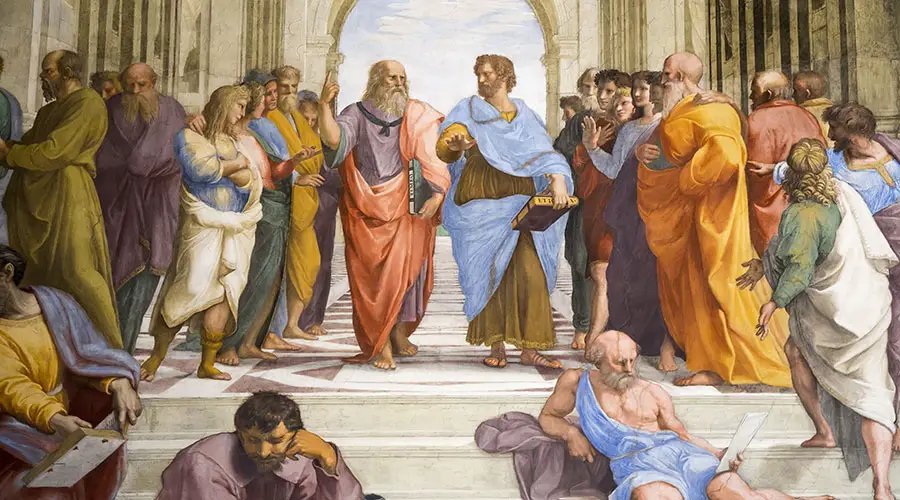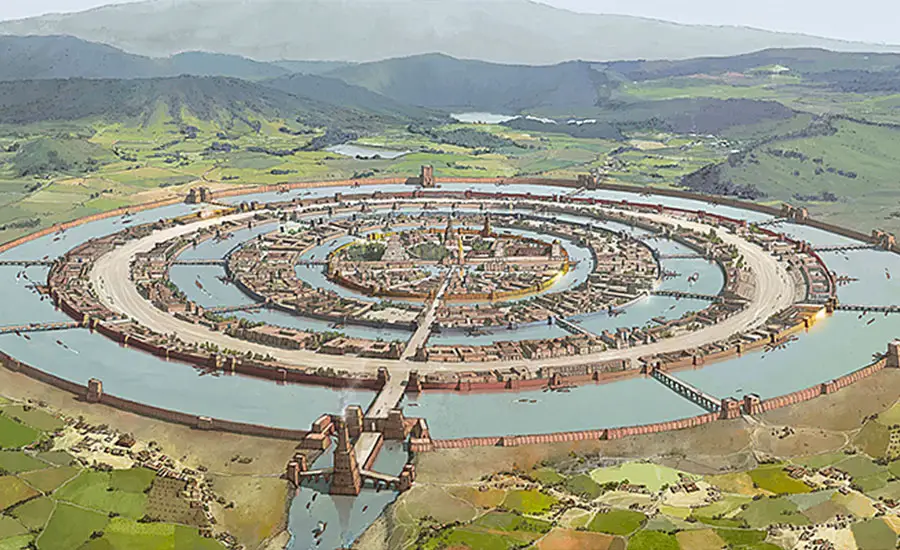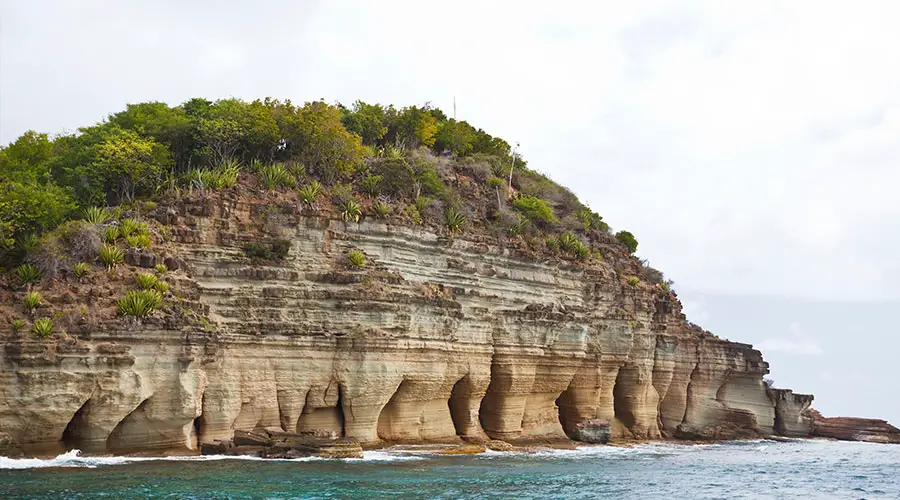Atlantis, the ancient lost civilization has inspired the imaginations of people for thousands of years, and was originally described by the Greek philosopher Plato. In this article we are going to answer the question: What did Plato say about Atlantis?
Plato described Atlantis in 360 BC as being a technologically advanced society that lived on islands shaped in concentric circles. They waged an unsuccessful war with Athens, and came to an abrupt end after internal fighting and a series of cataclysmic natural events around 9600 B.C.
Considered the greatest philosopher of all time, Plato said that Atlantis existed about 9000 years before his time, and that knowledge of the lost civilization had been passed down the generations. His writings are recognized as the only written records of its existence.

Plato wrote about Atlantis in two dialogues called Timaeus and Critias
Plato described Atlantis in two Socratic dialogues called Timaeus and Critias, both written in 363 B.C. Besides describing Atlantis, these two books are cornerstones of western esoteric tradition, having deeply influenced Gnosticism, Hermeticism, and the Kabballah.
The two books are a speech written to be told at the festival of Panathenaea, which honored the Goddess Athena. The dialogues describe a meeting to discuss the concept of the ideal state. At the request of Socrates, Timaeus of Locri, Hermocrates of Syracuse, and Critias of Athens met with him to share what they knew of how the ancient Athenians conducted their city state. Through this meeting, Plato describes the lost civilization.

How Plato Learned of Atlantis
Plato received the knowledge of Atlantis from an oral tradition that came from ancient Egyptian priests, who relayed the information to a Greek legislator named Solon, who lived 300 years before Plato. Solon (638-558 BC) visited Egypt where he met the priests of the goddess Neith, who passed on the knowledge of the lost civilization.
In Plato’s books, Critias describes how his great-grandfather had met Solon. Solon was one of the seven sages, a group of legendary philosophers. While studying with the priests of the goddess Neith in Egypt, Solon learned that an advanced civilization named Atlantis had existed earlier in history, and had been destroyed. One of the Egyptian priest described it to him:
“There have been, and there will be again, many destructions of mankind arising out of many causes; the greatest have been brought about by fire and water.” The priest adds, “You remember a single deluge only, but there were many previous ones” (Timaeus 22c, 23b).
Atlantis As Described by Plato
According to the description passed from Critias’ grandfather, who received it from Solon, who learned about Atlantis in Egypt, Atlantis was a powerful city state that had existed on an island in the Atlantic Ocean. It was an imperialistic empire, which ruled over other islands, as well as part of Africa and Europe.
The civilization consisted of a series of islands of concentric circles. Plato described Atlantis as possessing 10,000 chariots, advanced technologies, a series of complex canals, and a vast number of bull and elephants. The soil was rich, and abundant agriculture was produced in the plains area of the island, which made use of sophisticated irrigation systems. In the centre of the island where public baths, including fountains with hot and cold water, and recreation areas, as well as a government and military.

According to Plato, the Atlanteans mined white, black, and red stones for use in their construction. The circles of land had outer walls covered in brass, and the inner walls were orichalch. In the central island was a sanctuary dedicated to Poseidon and Cleito, which was surrounded by gold walls. This was where the first ten princes of Atlantis were born, and their descendants would bring them offerings.
In the center of the sanctuary dedicated to Poseidon and Cleito was the temple of Poseidon, which featured a large gold statue of the gold standing in a charity, being pulled by 6 winged horses, and accompanied by sea nymphs riding dolphins.
The center of Atlantis also featured bathes, including fountains of warm and cold water. There were bathes for the royals, as well as for the public, and also for horses. Atlantis also featured a large stadium and track for race horsing.
There was a large rectangular plains area where the Atlanteans would produce food. Water was fed to this region from the mountains using a massive ditch 100 feet deep, which would also feed the extensive canals and aqueducts of the society.
Throughout Plato’s two books are references to higher beings, or gods. Plato describes the inhabitants of Atlantis as being half human and half god, and of great wisdom and spiritual enlightenment, as well as possessing advanced technology.
Atlantis and Athens
Contrary to ideas about Atlantis that came later than Plato, he describes it not as a peaceful utopia, but rather as an empire with an army, who was enemies with Athens, his home city state. According to Plato’s writings, Atlantis tried to use its military to dominate the ancient Greek world, but was stopped by Athens in a military conflict.
The Atlantean army drafted soldiers from its mountains and plains regions, and possessed 10 000 chariots, as well as extensive soldiers, archers, javelin throwers, and many sailors aboard their 12o0 ships.
When Atlantis waged an unprovoked war on parts of Asia and Europe not yet under their control, Athens, despite being a much smaller city state, triumphantly defeated Atlantis’s attempt at conquering them.

Origins of Atlantis
According to Plato, in the beginning of the world the gods divided earth amongst themselves. Each god had their own allotment and established temples, a priestcraft, and a system of sacrifice. Poseidon was given the sea and the island continent of Atlantis. On the island was a mountain where three humans lived, a man named Evenor, along with his wife Leucipe, and their daughter Cleito. The daughter was very beautiful and when her parents died she was wooed by Poseidon. Together they had five pairs of twin sons. Poseidon established them as the rulers of the continent, with Atlas, the eldest, being the overlord of the others. The part the islands closer to the Pillars of Hercules, were given to Atlas’s twin Gaedeirus. Poseidon named the continent Atlantis, and the surrounding ocean the Atlantic. He made the continent a series of perfect concentric circles of land and water. Two zones of land and three of water surrounded the central island, which was irrigated by two springs of water, one warm and one cold.
The descendants of Atlas continued to rule Atlantis, and it became a utopian-like country. There were abundant natural resources, including precious metals and domesticated animals. The island had a plains area which was used for agriculture, which was watered by their sophisticated irrigation system. They constructed palaces and temples, as well as bridges and canals from the outer sea zones to the central island where the palaces were. The most magnificent of the palaces in the central island was the temple of Poseidon. You can read more about the origins of Atlantis here.
Who Was Plato?
Plato was a citizen of Athens, who live from 428-438 B.C. His work is of unparalleled influence, and dealt with ethics, physics, including such topics as justice, beauty, and equality, He was a student of Socrates, the teacher of Aristotle, and founded the Academy, the first institution of higher learning in the Western world. Read more about Plato here.

Where Was Atlantis Located According to Plato?
Plato’s books are not clear on the location of Atlantis, though there are many theories. Studies have shown that the bottom of parts of the Atlantic Ocean show evidence of once being above water. Some believe that the island Santorini, which was destroyed by a volcano in 1600 B.C, was Atlantis. Plato’s writings do include some clues to the location however:
“situated in front of the straits which are by you called the Pillars of Heracles [the Straits of Gibraltar]. The island was larger than Libya* and Asia put together, and was the way to other islands, and from these you might pass to the whole of the opposite continent which surrounded the true ocean” (Timaeus 25e).
The Pillars of Hercules are Located between Europe and Morocco and are pieces of land called promontories, which are pieces of land that jut out from the side of the coast. According to Greek mythology they were placed there by Hercules. This has been interpreted by many to suggest that Atlantis was located near that part of the world.
The Fall of Atlantis
According to Plato, Atlantis reach its demise around 9600 B.C. The nation destroyed itself as a result of the irreverent use of dangerous supernatural powers. Shortly after its failed attempt at conquering Athens, a series of earthquakes sunk Atlantis into the ocean, completing wiping it off the face of the earth.
“in a single day and night … disappeared into the depths of the sea.” – Plato
The cataclysm was created by the gods In response to the Atlanteans growing materialism and lack of reverence, and in a single cataclysmic night they sent fire and earthquakes that made Atlantis sink into the ocean, completely destroying the civilization.
“After having undergone the very extremity of danger, she defeated and triumphed over the invaders, and preserved from slavery those who were not yet subjugated, and generously liberated all the rest of us who dwell within the Pillars. But afterward there occurred violent earthquakes and floods, and in a single day and night of misfortune all your warlike men in a body sank into the earth, and the island of Atlantis in like manner disappeared in the depths of the sea. For which reason the sea in those parts is impassable and impenetrable, because there is a shoal of mud in the way, and this was caused by the subsidence of the island” (Timaeus 25c-d)
Atlantis as an Allegory
Interpretations of Plato’s writing on Atlantis are split, with some taking it to be a literal description of a real place, while the majority see his writing as being a fictional story in which Plato intended to make a philosophical statement. When viewed as a legend or myth, a meaning can be found in the story of Atlantis. it represents a failed utopia which teaches us a lesson about how to properly conduct a state. It is the story of highly ethical and spiritually enlightened people who lost their way by becoming greedy, corrupt and gluttonous. Their ways lead them to their demise, as they stop living in harmony, and their civilization is destroyed by earthquakes that sink them into the ocean.
Other interpretations point out its commentary on wealth vs modesty, and maritime vs agrarian societies, as it describes the smaller but ethical state triumphing over the larger corrupt aggressor.
Atlantis Found
Over the years there have been many claims that Atlantis has been found. Perhaps most popularly known is the claimed discovery off the coast of Spain. Other researchers dispute this claim, as well as all other claims, in part pointing to the fact that the Mediterranean ocean is full of the ruins of previous other civilizations.
Searches for Atlantis continue to this day. In recent years a company called Merlin Borrows has been looking off the coast of Spain, referencing historical records and combining with satellite data. Focusing on a region of Spain just inland of the coast called Doñana National Park, they discovered large circles that they believe could be the base of Atlantean temples. They also claim to have found evidence of cataclysmic events that could be related to the end of Atlantis.
In 2009 and 2010 an American team continued the search just north of the city of Cadiz, in Spain. Using deep-ground radar, and digital mapping, they surveyed a marshland region of Spain called Dona Ana park.
Recommended Reading
If you want to continue exploring the subject of Atlantis more deeply, you can see which books I recommend by clicking here.

